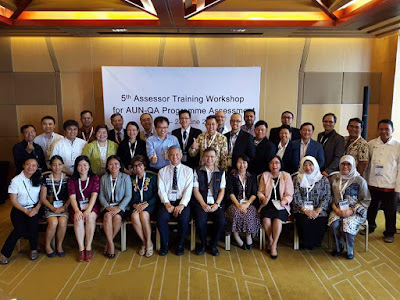Innovation and entrepreneurship have been hailed as the twice
engines for the next stage of economic growth and competitive advantage in the
era of Industry 4.0 in an uncertain globalized world. In facing the dynamic
evolution and development of Industry 4.0, higher education institutions (HEIs)
as a key supplier of quality workforce are actively seeking new strategies and
approaches in education to overcome the challenges and to exploit the
opportunities in Industry 4.0. For HEIs
to remain relevant in Industry 4.0, there seems to be a consensus among
educators to transform and elevate existing education system into Education
4.0.
Education 4.0 relates education as ubiquitous where people, things
and machines are connected to produce personalized learning. This new ecosystem
transforms education institution into an innovation-producing ecosystem. HEI can transform itself into an innovation producing
ecosystem by embracing the 4Cs Framework namely; Competence, Capacity, Collaboration and Culture.
Competence relates to the development of attitude, skills
and knowledge to cultivate innovation and entrepreneurship among students and
faculty members. Capacity is about the creation of both internal and external
enablers (such as incubations, test beds, intellectual property management
etc.) to support innovation and entrepreneurship within and beyond the HEI.
Capacity can be said to be the hardware of engaging stakeholders in nurturing
innovation and entrepreneurship while collaboration is the software of
connecting and engaging stakeholders – business/industry, government and
community. To sustain the innovation-producing ecosystem, HEI needs to
cultivate a sustainable culture of innovation and entrepreneurship.
For the innovation-producing ecosystem to be flourishing and
sustainable, the environment in the ecosystem should embrace a flourishing
environment, seamless connectedness, and a holistic and integrated education
system. A flourishing environment may include but not limited to laws,
regulations, taxes and incentives, intellectual property protection and
investments that supports innovation and entrepreneurship. Seamless connectedness
is not only about digital connectivity but also about connectedness and access
to regional and global economies and markets. A holistic and integrated
education system is needed to complement the innovation-producing ecosystem to
ensure that education is not only holistic but also integrated for development
and progression from basic education to vocational and technical education and
to higher education as well as the development of lifelong skills in the
workforce.
Source: The 4Cs Framework to Transform Higher Education Institution into an Innovation Producing Ecosystem, Mr. Johnson Ong Chee Bin and Ms.

















